Related Research Articles
Baron Mostyn, of Mostyn in the County of Flint, is a title in the Peerage of the United Kingdom. It was created in 1831 for Sir Edward Lloyd, 2nd Baronet, who had earlier represented Flint Boroughs and Beaumaris in the House of Commons. His son, the second Baron, sat as a Member of Parliament for Flintshire and Lichfield and served as Lord Lieutenant of Merionethshire.
Sir Thomas Hanmer, 4th Baronet (1677–1746) was Speaker of the House of Commons, MP for Flint 1701–1702, Flintshire 1702–1705, Thetford 1705–1708 and Suffolk 1708–1727.
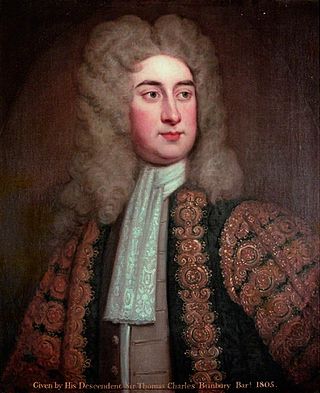
Sir Thomas Hanmer, 4th Baronet was Speaker of the House of Commons of Great Britain from 1714 to 1715, discharging the duties of the office with conspicuous impartiality. His second marriage was the subject of much gossip as his wife eloped with his cousin Thomas Hervey and lived openly with him for the rest of her days. He is, however, perhaps best remembered as being one of the early editors of the works of William Shakespeare.
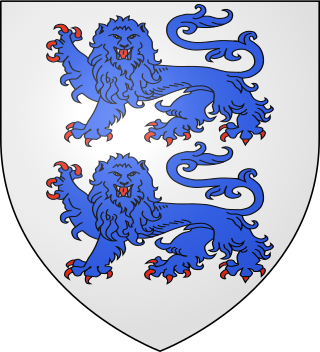
There have been two baronetcies created for members of the Hanmer family of Flintshire, Wales, one in the Baronetage of England and one in the Baronetage of Great Britain. Only one creation is extant as of 2008. The third Baronet of the second creation was elevated to the peerage as Baron Hanmer in 1872, a title which became extinct in 1881. The family name derived from the manor of Hanmer in the Diocese of St. Asaph.

The Bunbury Baronetcy, of Bunbury, Oxon and Stanney Hall in the County of Chester, is a title in the Baronetage of England. It was created on 29 June 1681 for Thomas Bunbury, Sheriff of Cheshire from 1673 to 1674 and the member of an ancient Cheshire family. His grandson, Henry, the third Baronet, and great-grandson, the fourth Baronet, both sat as Members of Parliament for Chester. The latter died unmarried at an early age and was succeeded by his younger brother, the fifth Baronet. He was a clergyman. On his death in 1764 the title passed to his eldest son, the sixth Baronet. He represented Suffolk in the House of Commons for over forty years but is best remembered for his marriage to Lady Sarah Lennox. He died childless in 1821 and was succeeded by his nephew, the seventh Baronet. He was the son of Henry Bunbury, younger son of the fifth Baronet. The seventh Baronet was a distinguished soldier and politician. His eldest son, the eighth Baronet, was High Sheriff of Suffolk in 1868, and Fellow of the Royal Society. He died childless in 1886 and was succeeded by his younger brother, the ninth Baronet. He was Liberal Member of Parliament for Bury St Edmunds. He died unmarried in 1895 and was succeeded by his nephew, the tenth Baronet. He was the son of Colonel Henry William St Pierre Bunbury, third son of the seventh Baronet. He served as High Sheriff of Suffolk in 1908 and was a Deputy Lieutenant of the county. On his death in 1930 the title passed to his son, the eleventh Baronet. He was High Sheriff of Suffolk in 1936 and was a Deputy Lieutenant of the county. His son, the twelfth Baronet, was High Sheriff of Suffolk in 1972. As of 2014 the title was held by the latter's second but eldest surviving son, the thirteenth Baronet, who succeeded in 1985.
Sir Henry Bunbury, 3rd Baronet of Stanney Hall, Cheshire was a British Tory politician who sat in the English and British House of Commons for 27 years from 1700 to 1727. At the time of the Hanoverian Succession in 1714 he was a Hanoverian Tory, but later offered support to the Jacobites.
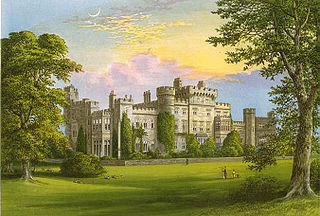
Sir John Glynne, 6th Baronet was a Welsh politician and landowner.

The Mostyn baronets are two lines of Welsh baronets holding baronetcies created in 1660 and 1670, both in the Baronetage of England. One creation is extant as of 2015. The two lines are related and both claim descent from Edwin of Tegeingl, an 11th-century lord of Tegeingl, a territory which approximates modern Flintshire.

Sir Job Charlton, 1st Baronet KS was an English judge and politician who sat in the House of Commons between 1659 and 1679. He was Speaker of the House of Commons of England briefly in 1673.
Sir Roger Mostyn, 3rd Baronet, of Mostyn Hall, Holywell, Flintshire, was a Welsh Tory politician who sat in the English and British House of Commons for 25 years from 1701 to 1735.
John Hanmer, 1st Baron Hanmer, known as Sir John Hanmer, Bt, between 1828 and 1872, was a British politician.
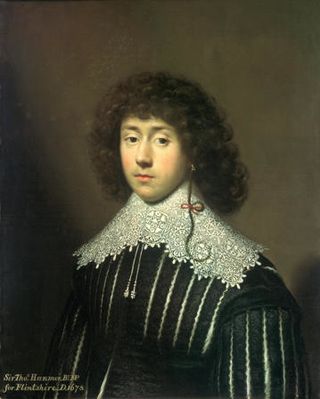
Sir Thomas Hanmer, 2nd Baronet (1612–1678) was an English politician who sat in the House of Commons in 1640 and from 1669 to 1678. He was a Royalist during the English Civil War and raised troops for Charles I. In his personal life, he was a keen horticulturist. He is not to be confused with Sir Thomas Hanmer, 2nd Baronet (1747–1828) of the second creation, nor with his grandson, Sir Thomas Hanmer, 4th Baronet.

Sir Richard Myddelton, 3rd Baronet, of Chirk Castle, Denbighshire, was a Welsh landowner and Tory politician who sat in the House of Commons from 1685 to 1716.
Sir Henry North, 1st Baronet was an English politician who sat in the House of Commons variously between 1656 and 1671.

Sir Erasmus Philipps, 3rd Baronet was a Welsh politician who sat in the House of Commons in 1654 and 1659.

Sir John Hanmer, 1st Baronet (1590–1624) was an English politician who sat in the House of Commons in 1624.
Sir Roger Mostyn, 5th Baronet was a Welsh landowner and politician who sat in the House of Commons for 38 years from 1758 to 1796.

Sir John Conway, 2nd Baronet of Bodrhyddan Hall, Rhuddlan, Denbighshire was a British landowner and Tory politician who sat in the House of Commons between 1685 and 1721.
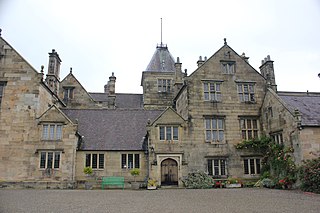
Sir Thomas Mostyn, 6th Baronet of Mostyn Hall, Flintshire and Gloddaeth Hall, Caernarvonshire, was a Welsh Member of Parliament.
This article is about the particular significance of the year 1701 to Wales and its people.
References
- ↑ John Hanmer (1st baron) (1876). A Memorial of the Parish and Family of Hanmer in Flintshire ... priv. Press at the Chiswick Press. p. 180.
{{cite book}}: CS1 maint: numeric names: authors list (link) - 1 2 George E. Cokayne Complete Baronetage, Vol. 1 (1900)
- ↑ Dodd, Arthur Herbert. Hanmer family. Dictionary of Welsh Biography, online edition. Retrieved 22 December 2015.
- ↑ Bunbury, Henry Edward, ed. (1838). The correspondence of Sir Thomas Hanmer ... with a memoir of his life, to which are added, other relicks of a gentleman's family. London: Edward Moxon. pp. 4–5. [Bunbury was Thos. Hanmer's brother-in-law.]